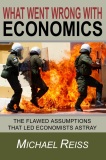When people first heard about QE they were nervous. Many economists said that it would cause high inflation. QE got a bad press. Well now years have gone by, we’ve had huge amounts of QE in many countries and there has not been much in the way of inflation. Indeed the price of many items has been steadily falling. Houses for example. So does this mean that QE isn’t so bad after all? Is it just a technical process with no bad side effects?
Misrepresented in the media…
The first thing to say is that Q.E. has been appallingly misrepresented in the media. You will see it described as “money printing” again and again. This is very misleading. Money printing is a one step process; you print the money and that’s the end of it. There’s nothing more to be done. Plain old money printing is in fact, against EU regulations, and is also illegal in both the US and Japan. Q.E. is much more accurately described as borrowing money into existence; with a resulting obligation to make even more money (the original amount plus interest) disappear back out of existence. This obligation places a burden on our economies in the future. It’s more “kicking the can down the road”.
I was so infuriated by the media repeatedly describing Q.E. as money printing, that just as an experiment, I’d make a complaint to the BBC. Their reply was that, according to a financial dictionary, Q.E. is a term described as “a monetary policy in which the central bank engages in open market transactions aimed at increasing money supply in the economy. Easing could also involve direct money creation (printing).” … I have since replied with a letter telling them to note the word “could” in the definition. I.e. it could involve direct money printing, but only in another country or at another time in our history when it wasn’t against regulations. But in the UK, today, it is not allowed! I am currently waiting to see what they say next - stay tuned.
So what happened to the inflation?
A naive view of money is that there is a pool of money out there that can never disappear, and that the amount only ever increases by virtue of governments creating more of it. If this were true, then such large amounts of Q.E. would indeed cause an immediate surge in inflation. However, modern (digital) money does not work like this at all. Instead money is in a continuous state of being created and destroyed. It is created when private banks make loans, and is destroyed when people pay the loans back. So the total amount of money that exists can be considered as analogous to physical system of water being poured into a leaking bucket. Imagine the water coming in corresponds to new loans being made and the water pouring through the leak corresponds to loans being paid back. The amount of water in the bucket at any one time is therefore highly dependent on the two rates of flow. In the economic climate since 2007, the rate of new loans being made by the private sector has slowed markedly, whilst all those previously existing mortgages and other long-term loans are still being paid back. This means the total money supply should be falling - leading to deflation. The huge amounts of Q.E. are not so much adding to the money supply, but rather is attempting to stop the money supply falling.
Strangely, the financial media never present Q.E. in terms of preventing a fall in the money supply. In all the time I have been listening to various financial pundits, I have not once heard it being described as such. Indeed I have scarcely even heard the concept of a falling money supply ever mentioned in any context. I was beginning to feel like I was the only person who was aware of what Q.E. was all about until at long last I heard Mervyn King himself being questioned by MP’s saying:
"What we were doing was injecting money into the economy and what the banking system has been doing is destroying money".
"What we were doing was to partially offset what would otherwise been an even bigger contraction."
There is a video of his statement here:
http://www.bbc.co.uk/news/business-15446545
Why Q.E. is a burden for the future.
When bank-issued loans are paid back the money disappears. When the coupon and principal on bonds is paid back, that money does not disappear - except that is, when those bonds are held by the central bank.
Armed with this information, lets consider the consequences of a central bank owning large amounts of government bonds (as compared to the more usual scenario of the private sector owning all those bonds).
In order for the government to pay back loans, it has to gather more in tax revenues than it pays out for all its regular functions. An unusual concept I know, but it has to be done occasionally! If it’s the private sector that owns all of the government bonds, then as the government pays back, the money supply does not change. The people receiving the money can then circulate it into the rest of the economy and it can be taxed again and again. If however it’s the central bank that owns the bonds then the process of the government paying off its debts destroys the money. The money will not go on to circulate in the rest of the economy. Thus the money supply will shrink and it will become ever harder to repay the debts as the repayment process progresses. Indeed a shrinking money supply normally brings on recessions. Thus the process of unwinding Q.E. will be an ever more painful process as it goes along. At some point the system will no doubt break.
Of course none of this nonsense would be going on if we had a sensible monetary system like full reserve banking.
Tweet



